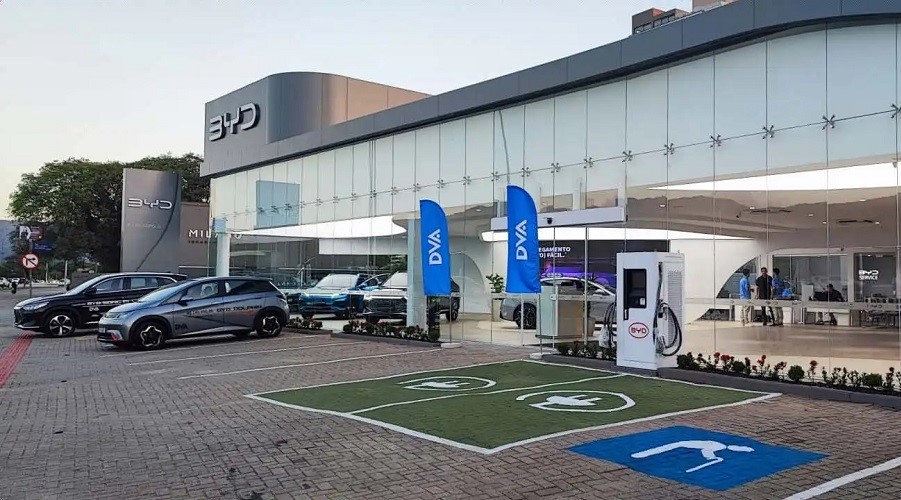BYD, currently the leader in electric and hybrid vehicle sales in Brazil, is also developing one of the country’s largest public-private fast-charging networks.
According to the Chinese company, over 50 charging stations have already been installed at its dealerships in cities such as São Paulo, Salvador, Brasília and Florianópolis.
The chargers are available to any electric vehicle (BEV) driver, regardless of the brand, and so far, their use has already delivered 1,435,000 kWh and prevented the emission of 215 tonnes of CO₂.
By the end of 2025, the automaker expects to have more than 150 public fast chargers available at BYD stores across Brazil, consolidating a nationwide energy infrastructure network focused on clean mobility.
The operation will be managed through the BYD Recharge app, which offers a complete experience by allowing users to reserve spaces, monitor charging in real-time, and calculate the environmental impact of the charging process.
Ambitious and concrete plans from BYD in Brazil
“Our proposal goes beyond selling electric and hybrid vehicles. We are helping to build a reliable infrastructure for Brazil to move forward in its energy transition, with a focus on transport decarbonisation,” said Alexandre Baldy, Senior Vice President of BYD Brazil and Director of Sales and Marketing of BYD Auto.
“Each charger installed is one more step towards a cleaner and more efficient future,” he added.
On another note, the company specified that all public chargers available at dealerships are fast chargers, with a power output of up to 120 kW.
The operation and payment are carried out through the BYD Recharge app, which offers:
• Location of over 2,600 chargers and real-time status of more than 1,000 (including partners)
• Space reservations and real-time monitoring
• Remote charge termination
• Consumption history
• Reports on CO₂ emissions avoided
• Route planner with charging points
• Discount coupons
• Free service every day of the week, including holidays and weekends
Higher volume of recharges, fewer pollutant emissions
The Brazilian automotive market is undergoing a major transformation with the growing adoption of electrified vehicles, and nearly 8 out of 10 electric cars sold in the country are BYD models, reflecting a shift in consumer behaviour and greater trust in electric mobility.
Capitals such as Salvador, Brasília and São Paulo stand out both for the number of chargers installed and the volume of energy delivered, reinforcing the growing adoption of electric mobility in these areas.
Together, these units have already avoided the emission of over 32 tonnes of CO₂, considering that, on average, every 1 kWh consumed by an electric vehicle prevents 0.090 kg of CO₂ compared to a combustion engine vehicle.
BYD’s fast chargers are now present in all regions of Brazil, keeping pace with the growth of electric mobility in capital cities and main urban centres:
• Northeast: Salvador leads, with over 125,000 kWh combined between the Via Sul and Parvi Paralela dealerships
• Southeast: São Paulo accounts for around 117,000 kWh between the Nações Unidas and HBW points
• Central-West: Brasília hosts the country’s highest individual-consumption charger at the Bali Saan unit
• South: Florianópolis has already surpassed 40,000 kWh delivered by the DVA dealership
• North: The region is starting to be covered by new chargers, as part of the brand’s national expansion strategy
BYD’s initiative is part of its greentech vision to build a comprehensive sustainable mobility ecosystem that integrates electrified vehicles, solar energy, batteries, and charging infrastructure.
“Each kilowatt recharged means fewer pollutants in the air and less reliance on fossil fuels. It’s a silent but profound transformation, and the BYD Recharge network is the engine of this change,” concludes Baldy.






